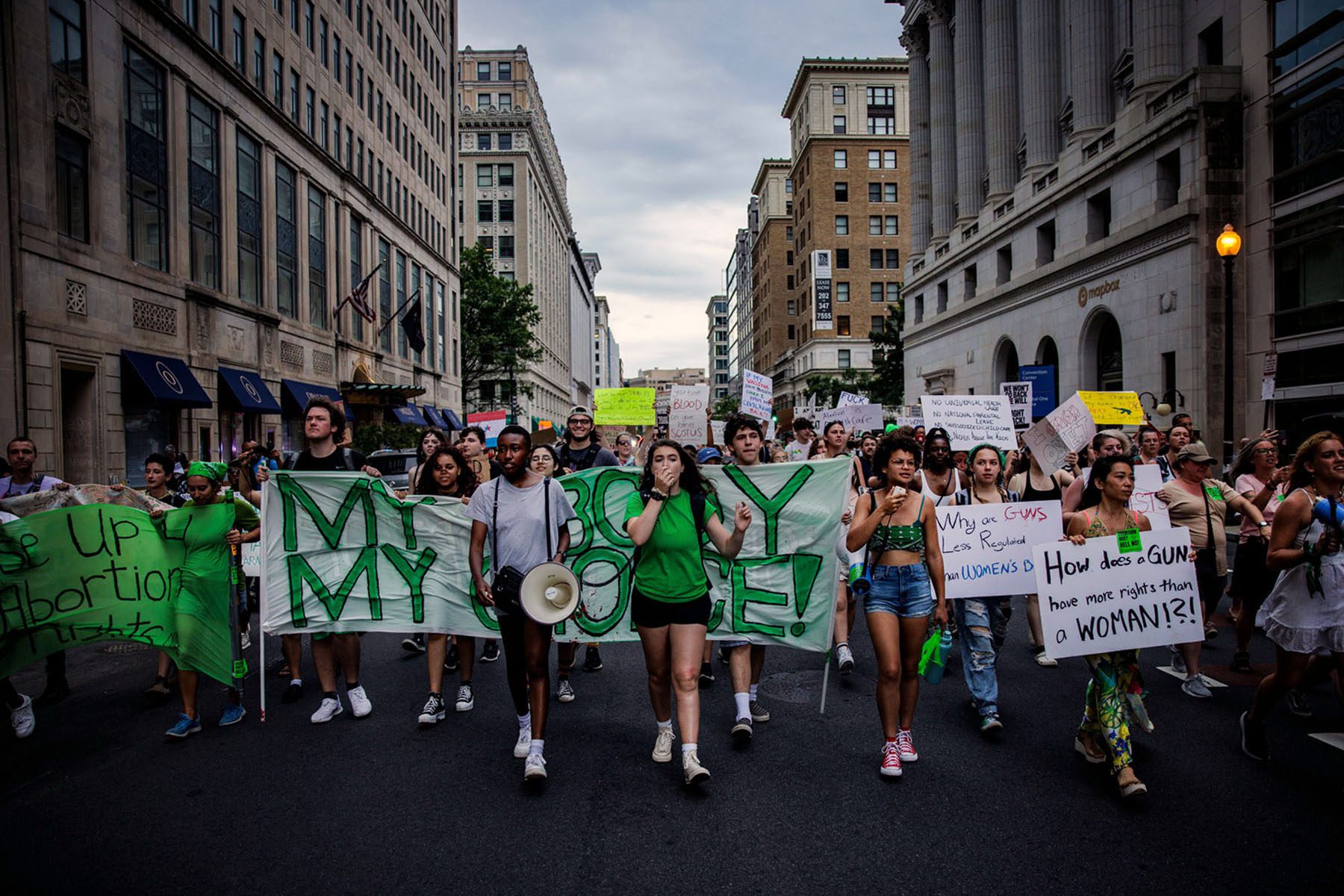We’re answering the “how” and “why” of abortion news. Subscribe to our daily newsletter.
Americans have become more supportive of abortion rights over time, and it’s not necessarily tied to the Supreme Court case last summer that overturned federal abortion rights, according to a new study.
The nonpartisan Public Religion Research Institute (PRRI) released a report Thursday that shows support for abortion legality in all or most cases has risen since 2010, with a notable increase beginning in 2020. Fifteen percent of Americans believed in 2010 that abortion should be illegal in all cases — an opinion that only 7 percent of Americans held at the end of 2022.
The report summarizes recent results from the American Values Atlas, an annual survey by PRRI. This year’s survey was conducted online from March to December 2022, and the report also includes findings from a one-off survey in June. The main survey has a nationally representative sample size of 22,984 adults in all states and the District of Columbia. The margin of error is 0.8 percentage points.
PRRI’s more extensive survey shows abortion attitudes haven’t changed much since the Dobbs v. Jackson Women’s Health Organization ruling in June that effectively repealed Roe v. Wade, the 1973 decision that gave people the right to an abortion. Sixty-four percent of Americans surveyed in March 2022 said they felt abortion should be legal. In June, that figure was 65 percent. Surveys fielded in August, September and December showed a variance of only a few percentage points.
As previous polling has shown, Americans across many demographic groups support abortion legality in all or most cases. The majority of all racial and ethnic groups support abortion rights, and those views didn’t change over 2022.
The report also shows that a vast majority of LGBTQ+ Americans support abortion rights in all or most cases (83 percent), compared with 63 percent of cisgender heterosexual Americans. The majority of women and men also support abortion in all or most cases (65 percent and 62 percent respectively). There is no nonbinary data in the survey report.
The data reveals the increase in support for abortion legality has been driven in part by Democrats: In 2010, Democrats’ support for abortion in most or all cases was at 71 percent. Throughout 2022, the vast majority of Democrats (86 percent) said abortion should be legal in most or all cases.
The survey, like much abortion polling, asks respondents whether they think abortion should be legal in all cases, legal in most cases, illegal in most cases or illegal in all cases. The categories are vague, Melissa Deckman, CEO of PRRI, says, and the option of “illegal in most cases” tends to mean bans with exceptions, not necessarily limited at a gestational age.
“I do think there is a longer trend of especially Democratic Americans — big D partisanship — in terms of that we see more support for abortion rights in general,” said Deckman.
But Republicans have also become less supportive of complete abortion bans over time. Today, only 14 percent want abortion completely outlawed, compared with 22 percent in 2010. There is a slight gender difference throughout 2022: Throughout the course of the year, Republican women became less likely to support total bans (20 percent down to 15 percent) while Republican men mostly stayed the same (15 percent down to 13 percent).
The most striking difference on abortion opinion between age groups is the share of Americans who support abortion in all cases. Thirty-eight percent of people ages 18-29 support abortion legality in all cases, and that support declines in older age groups. Among the next age group, 30-49-year-olds, 29 percent support abortion in all cases.
Around one in 10 young people think abortion should be outlawed in all cases. It’s a small amount that doesn’t seem to be growing, Deckman said.
Deckman added that it’s “instructive” that more Americans are less supportive of total abortion bans given that several states have such a policy in place following the Dobbs decision.
“They're not even reflecting public opinion in their own states,” she said. No state had more than 14 percent of people indicating support for total abortion bans, including Arkansas, Louisiana, Tennessee, Texas and West Virginia.
In fact, the majority of Americans (53 percent) are in favor of Congress passing a law to preserve the right to abortion. Only one-third of Americans (31 percent) said that abortion law should be left to the states, and 12 percent said Congress should pass a national ban. PRRI asked this question in a separate survey of 2,030 Americans, right after the Dobbs verdict was announced in June. The margin of error was 2.3 percentage points.
The opinions are polarized along party lines, with 78 percent of Democrats saying Congress should pass a law protecting abortion. Half of Republicans said that abortion laws should be dictated by the states, while 22 percent expressed support for a national ban. Independents were more in favor of a national law protecting abortion, with over half agreeing, while 34 percent said it should be determined by the states.
How a candidate views abortion may also play a role in how Americans vote in the future, at least for Democrats, according to the survey. In 2022, 26 percent of all Americans who said abortion should be legal in all or most cases said they will only vote for a candidate who shares their view on abortion — an increase from 15 percent in 2020. For Democrats, that figure doubled from 17 percent in 2020 to 34 percent in 2022; for Republicans who said abortion should be illegal in most or all cases, the trend is going in the opposite direction: down 12 percentage points from 42 percent in 2020 to 30 percent in 2022.
“For Democrats who are very supportive of abortion rights or lean in that direction, this has suddenly become a much more important issue,” Deckman said. “And I think we saw some of that anecdotally … in the midterms, where abortion became a flashpoint.”
There was also a difference in the importance of a candidate’s abortion stance between men and women. Women were more likely than men to say they will only vote for candidates who share their views on abortion (29 percent vs. 22 percent). While the gender differences held true across ages, young women were more likely to say so. “What we're seeing here is that for younger women, especially women of childbearing age, [abortion] is more important to them as an election issue, especially for those who are more supportive of abortion rights,” Deckman said. “Whereas with men, it's not factoring in nearly as much.”
The survey also examined how religious beliefs impact abortion attitudes. Thirty-one percent of Americans say that their religious faith dictates their views on abortion. But over half of Republicans (52 percent) say their opinions on abortion are tied to their faith, compared with 26 percent of Democrats and 20 percent of Independents.
Abortion rights have support across the majority of different faiths. With a few exceptions — White evangelical Protestants, Latinx Protestants, Jehovah’s Witnesses and Mormons — the majority of each faith group analyzed by PRRI supported abortion legality in all or most cases.
“I think this study shows that most people of faith, those people that identify with a religion, tend to actually be more likely to favor abortion rights as opposed to favor restrictions,” said Deckman.
“I know from doing other analyses, social science research, peer-reviewed journal articles, … religiosity still matters when it comes to explaining abortion, even considering partisanship and other other kinds of factors,” she said.
Still, Deckman had some context for the intersection of party affiliation and religion. Some Republicans are more likely to be religious. And while some Democrats are also religious, particularly people of color, there is an increasing number of people who are unaffiliated with a religion.
“Those overlapping identities over time have meant that the partisanship and the religiosity combined together to help inform views of abortion, and why it is that on the right at least, the Republican Party has become so adamantly opposed to abortion … even to the extent of adopting unpopular policies broadly,” she said. “Most Americans don't think we should ban abortion, but yet, we're in a situation where state legislatures have done that very thing.”





